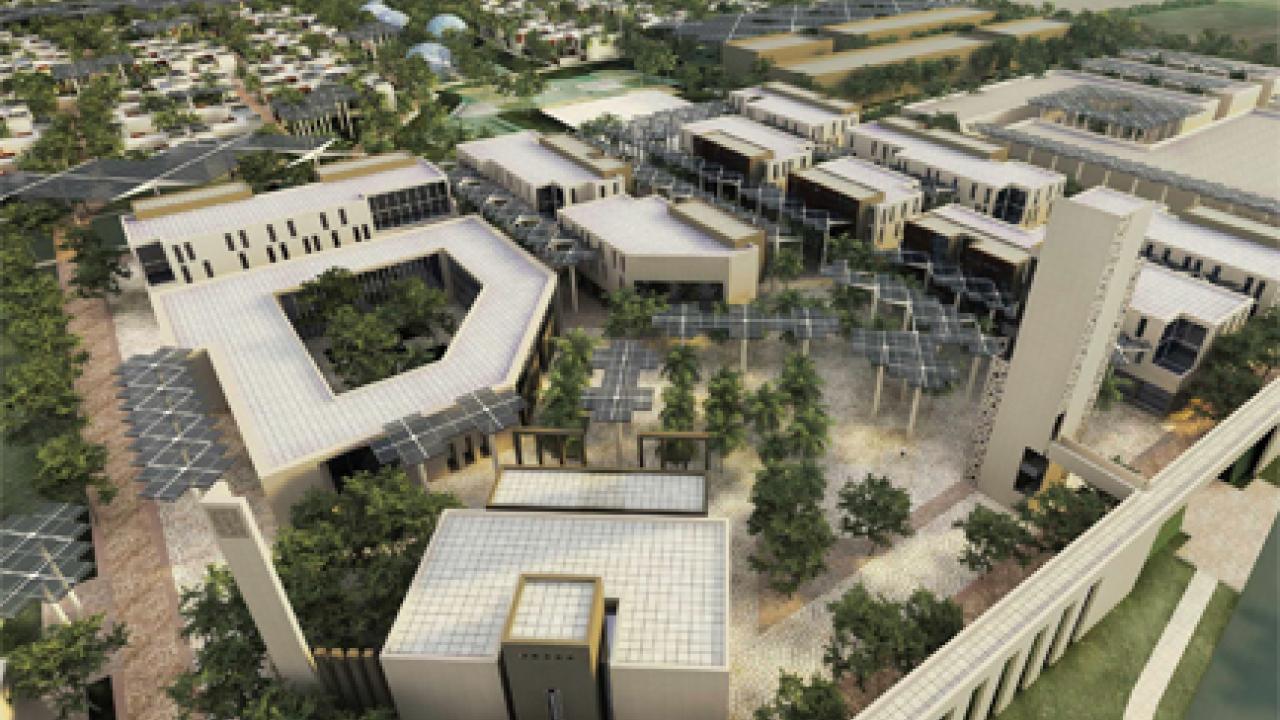Inspired by a visit to the innovative, energy-efficient UC Davis West Village in 2010, a Middle Eastern housing developer is now planning a sustainable city on the outskirts of Dubai in the United Arab Emirates.
Faris Saeed, chief executive officer of Dubai-based Diamond Developers, was on campus two years ago because of his involvement as a supporter of and donor to the university’s Middle East/South Asia Studies Program. He visited UC Davis West Village — the nation’s largest planned zero net energy community — just about a year ahead of its opening in October 2011.
This week, Saeed visited the campus again, only this time he brought with him other members of Diamond Developers, architectural renderings of Diamond's Dubai Sustainable City — and much more.
Diamond Developers on Friday (Nov. 9) signed an agreement of cooperation with the University of California Board of Regents, on behalf of the Davis campus, to formally collaborate in the areas of applied research and training related to each institution’s sustainable living community.
“All the world is going to environmental developments,” Saeed said. “The rulers in Dubai have envisioned green developments for all the city.”
Similar in size to the campus’s West Village, Diamond's Dubai Sustainable City is designed to provide housing for about 2,500 people on 120 acres while it aims to save 60 percent more energy and water than conventional structures in Dubai. Diamond Developers expects to break ground in late 2013.
“West Village is one of the more tangible things we’ve been able to see firsthand and applied,” said Phil Dunn, design manager for Diamond Developers, adding that Village Homes in Davis also served as inspiration. “Lots of these sustainable cities are just on paper.”
Foreign exchange
And now there is the newly signed agreement of cooperation, laying out Diamond Developers’ commitment to collaborate with UC Davis staff, faculty and potentially students.
“Faculty from UC Davis may go to Dubai for research and training, and perhaps they’ll send students here,” said Suad Joseph, UC Davis professor of anthropology and women and gender studies. “What is so innovative about this collaboration is the creation of sustainability through ongoing social and environmental research. This joint research is fed back into the development of the sustainable communities in Dubai.”
Saeed and his colleagues spent the past week getting a whirlwind tour of UC Davis. They visited such places as the Student Farm; the LEED Platinum-certified winery, brewery and food processing facility; a Sacramento biodigester built with technology invented by UC Davis Professor Ruihong Zhang; and, of course, UC Davis West Village. They also met with Chancellor Linda P.B. Katehi and several faculty and staff members to solidify the idea of collaborative partnerships.
In with the old, in with the new
United Arab Emirates is a country famous for extravagant architectural renderings of housing developments. Some of these have come to fruition, like the larger, high-tech sustainable development of Masdar City in Abu Dhabi. Some of them have not, such as The World, 300 artificial islands for the super rich. And some have been described as unsustainable, like the luxury hotel Palazzo Versace, replete with a refrigerated beach.
For its Sustainable City, Diamond Developers decided to look to traditional settlements of the region, Dunn explained. The design is based on low-tech but energy-efficient features that have been used for thousands of years, such as passive solar — whereby heat collection and distribution is maximixed or minimized depending on time of year.
But Saeed said much of his inspiration also came from UC Davis. Similar to UC Davis West Village, Dubai Susainable City will be designed to capture natural breezes, and will have solar panels on building and carport roofs, bioswales to conserve water, and frequent bus service and extensive pedestrian and bike paths, to minimize the use of cars.
Dubai Sustainable City also plans to incorporate living and learning, just like UC Davis, which includes a community college and will soon be home to several of the university's energy research centers.
In addition to apartments, single-family homes and retail space, Dubai Sustainable City will include a kindergarten through 12th-grade school and a university focusing on ecological engineering. Plans call for the community to serve as a living laboratory where architectural students can learn about energy efficient design, and agricultural students can use the city’s biodomes — geodesic greenhouses — as agricultural research facilities.
Dubai Sustainable City also will have something you will not see at UC Davis West Village: horses and trails for recreational riding ... and for manure to help fuel the Sustainable City’s biogas production plant.
Other planned features include wind tunnels, community gardens and water recycling.
“Dubai can be a harsh place to live in,” Dunn said. “It can get up to 50 degrees Celsius (122 degrees Fahrenheit). If we’re going to continue to develop and populate that part of the world, you have to look at creative solutions to make it more sustainable. Just as West Village is an example to replicate, we hope our development will be a model for others about how things should develop in Dubai and the UAE.”
Media Resources
Kat Kerlin, Research news (emphasis on environmental sciences), 530-750-9195, kekerlin@ucdavis.edu
